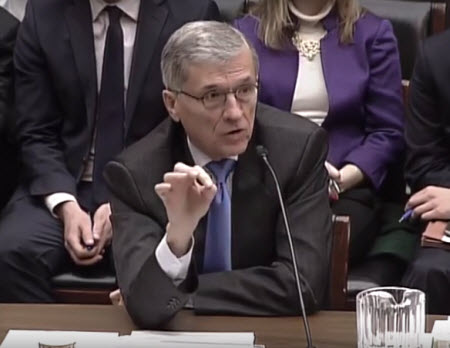Sen. Thune Hammers FCC's Wheeler on Senate Floor
The smarter way to stay on top of the multichannel video marketplace. Sign up below.
You are now subscribed
Your newsletter sign-up was successful

Senate Commerce Committee chairman John Thune (R-S.D.) took to the Senate floor Thursday (July 7) to criticize the FCC and its chairman over alleged disclosure of nonpublic information.
In a lengthy speech, Thune said independent agencies need to be accountable to the people but that in recent years the FCC has been behaving more like a de facto arm of the executive branch "wholly subservient to the President" than an independent agency reporting to Congress. President Obama has publicly pressed for Title II reclassification and "unlocking" the set-top box, both FCC hot topics.
Thune also talked about the recent partisanship at the agency, which he attributed to "an institution that has seized regulatory power while simultaneously shutting down bipartisan dialog and compromise."
As examples he cited the FCC's Lifeline reform, "backward looking" set-top box proposal, "power grab of stunning proportions" of new Title II-based net-neutrality rules, broadband privacy "power grab" and other actions, which he said had all been characterized by a lack of respect for the limits of the FCC's authority as delegated by Congress.
He called that a downward trajectory for the agency and blamed FCC chairman Tom Wheeler.
Thune said Wheeler had "embraced" partisanship over compromise. He also said the chairman exercises his powers with neither humility nor a light touch. Thune particularly took aim at what he suggested was selectively leaking nonpublic information, counter to FCC rules.
Thune cited the FCC's March 31 open meeting to illustrate selective leaks in service of his general "power grab" theme. That was the FCC's vote on Lifeline reform, which included the collapse of a compromise between the two Republican commissioners and Democrat Mignon Clyburn.
The smarter way to stay on top of the multichannel video marketplace. Sign up below.
The compromise was reported by various outlets, including Multichannel News, prior to the delayed meeting start. It ultimately fell through over Clyburn's decision that she could not support a cap on the Lifeline subsidy.
Thune said Wheeler was trying to exempt himself from the rule preventing disclosure of nonpublic information by selectively leaking information about the compromise. Thune said the result of the leak was that "the story spurred outside political pressure against the emerging bipartisan compromise, which subsequently fell apart" to be replaced by a party-line vote on the chairman's proposal, which did not have the cap Republicans favored.
The chairman’s office had no comment, but Wheeler has explained his position in a letter to Thune.
The senator said that, when pressed, the chairman would not say whether he had authorized the leak. Thune said Wheeler did answer that he was "empowered to do anything that streamlines the FCC's work." Thune called that a "specious" attempt to exempt the chairman from a clear FCC rule.
The senator said Wheeler was using the rule against disclosure of nonpublic information as both a shield and a sword, saying he was free to share such information, but suggesting Republican Ajit Pai had actually done so in violation of the rule.
The FCC Inspector General is currently investigating the leak, and Thune said he is looking forward to the findings.
Contributing editor John Eggerton has been an editor and/or writer on media regulation, legislation and policy for over four decades, including covering the FCC, FTC, Congress, the major media trade associations, and the federal courts. In addition to Multichannel News and Broadcasting + Cable, his work has appeared in Radio World, TV Technology, TV Fax, This Week in Consumer Electronics, Variety and the Encyclopedia Britannica.

